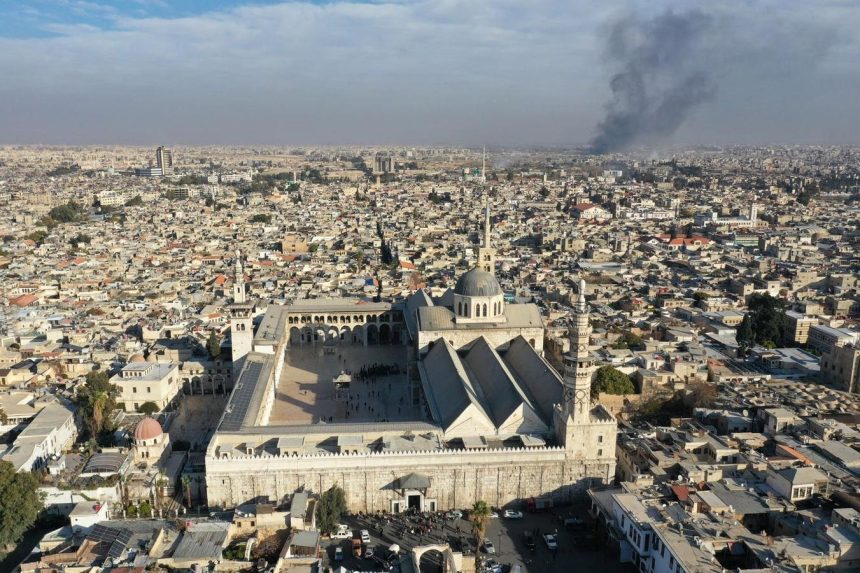The Fall of the Assad Regime and the Dawn of a New Era in Syria
After 24 years of iron-fisted rule, punctuated by a brutal civil war that has ravaged the nation for over a decade, Syrian President Bashar al-Assad’s reign has come to an abrupt end. Following a swift and decisive offensive by a coalition of rebel forces, spearheaded by the Islamist group Hayat Tahrir al-Sham, Assad has reportedly fled Syria and sought asylum in Russia, a long-time ally of his regime. This dramatic turn of events marks a pivotal moment in Syria’s history, ushering in a period of profound uncertainty and potential transformation for the war-torn nation. The fall of Damascus, the Syrian capital, to rebel forces signaled the final blow to Assad’s grip on power, culminating a week-long blitz that saw the rebels rapidly seize control of key cities, marking the end of the Assad family’s 54-year dynasty.
The rapid succession of events began with the rebel seizure of Aleppo, a significant strategic victory that paved the way for the final assault on Damascus. The rebel coalition, comprised of diverse anti-government factions united by their opposition to Assad, capitalized on a weakening of support from Assad’s key allies, Russia and Iran. Both countries, entangled in their respective geopolitical conflicts with Ukraine and Israel, appear to have scaled back their involvement in Syria, creating a window of opportunity for the rebels to advance. This shift in the regional power dynamic played a crucial role in enabling the rebel offensive to gain momentum and ultimately overwhelm Assad’s forces. The surprise takeover underscored the fragility of Assad’s position, despite his previous successes in reclaiming territory with the crucial backing of Russia and Iran.
The international community has responded to Assad’s departure with a mixture of cautious optimism and concern. US President Joe Biden expressed hope for “new opportunities” for the Syrian people and the region, pledging continued support for US allies and efforts to prevent ISIS from exploiting the power vacuum. While acknowledging the uncertainties that lie ahead, Biden’s statement reflects a sense of relief at the end of Assad’s brutal reign. The US also indicated renewed efforts to secure the release of Austin Tice, an American journalist kidnapped in Syria in 2012, raising hopes for his safe return. The international focus now shifts towards managing the transition of power and ensuring stability in a volatile region.
Within Syria, the immediate future remains uncertain. Prime Minister Mohammad Ghazi al-Jalali has vowed to work with the new leadership and called for free elections, signaling a commitment to a democratic transition. The rebel coalition, while celebrating their victory, faces the daunting task of rebuilding a shattered nation. Their commitment to respecting Syria’s diverse religious minorities will be closely scrutinized, as will their ability to govern effectively and maintain order. The potential for resurgence of extremist groups like ISIS adds another layer of complexity to an already fragile situation.
The evolving situation in Syria has also had significant geopolitical ramifications. Israel, a long-time adversary of Syria, has seized the opportunity to strengthen its position in the region. Prime Minister Benjamin Netanyahu attributed the rebel success to Israel’s military campaign against Hezbollah in Lebanon, ordering the Israeli military to secure the buffer zone between Israeli-occupied Golan Heights and Syria. The withdrawal of Hezbollah from Syria further underscores the shifting balance of power in the region. These developments highlight the interconnectedness of regional conflicts and the potential for ripple effects throughout the Middle East.
Looking ahead, Syria faces a long and difficult road to recovery. The immediate challenges include establishing a stable government, addressing the humanitarian crisis, and rebuilding the country’s devastated infrastructure. The international community will play a critical role in providing aid and support for the Syrian people as they navigate this uncertain transition. The possibility of renewed conflict and the potential for extremist groups to exploit the power vacuum pose significant threats to lasting peace and stability. The long-term success of the Syrian revolution hinges on the ability of the new leadership to unite the country, address the grievances that fueled the conflict, and build a more inclusive and democratic future for all Syrians. The world will be watching closely as Syria embarks on this challenging new chapter in its history.



